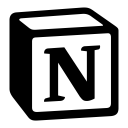Obsidian vs Notion: How to choose the right tool for your business
- 01Obsidian vs Notion: overview
- 02What's the difference between Obsidian and Notion?
- 03Obsidian pros and cons
- 04Notion pros and cons
- 05Obsidian compared to Notion
- 06Notion compared to Obsidian
- 07Features comparison
- 08Obsidian vs Notion: Which is the best for your business?
- 09Promotions on Productivity software
- 10Alternatives to Obsidian & Notion
Save up to $6,000 on Notion
Save up to $6,000 on Notion
Effective note-taking is crucial to the organizational success of businesses of all sizes. But without a good note-taking system, it’s easy for important details to slip through the cracks, leading to missed deadlines and wasted time trying to locate the information you need.
Luckily, there is a range of note-taking solutions available to help you manage information, streamline workflows, and collaborate on projects. In this article, we compare the differences between Obsidian vs Notion, two popular note-taking apps. Read on for our in-depth features comparison that will help you find the tool that best suits your business needs and budget.
Obsidian vs Notion: overview
Obsidian and Notion are two popular productivity and knowledge management tools with distinct strengths and features.
Obsidian stands out as a platform that excels in note-taking and knowledge organization through its robust linking and backlinking capabilities. Users can create a web of interconnected notes, making it easy to navigate between related topics and ideas. On the other hand, Notion is renowned for its versatility and wide range of functionalities, providing users with databases, project management tools, and note-taking capabilities, all in one platform.
To compare these two tools and determine which is best for your specific needs, it's essential to evaluate their differentiating elements in a comprehensive table, considering factors such as ease of use, organization features, collaborative options, and integrations.
What's the difference between Obsidian and Notion?
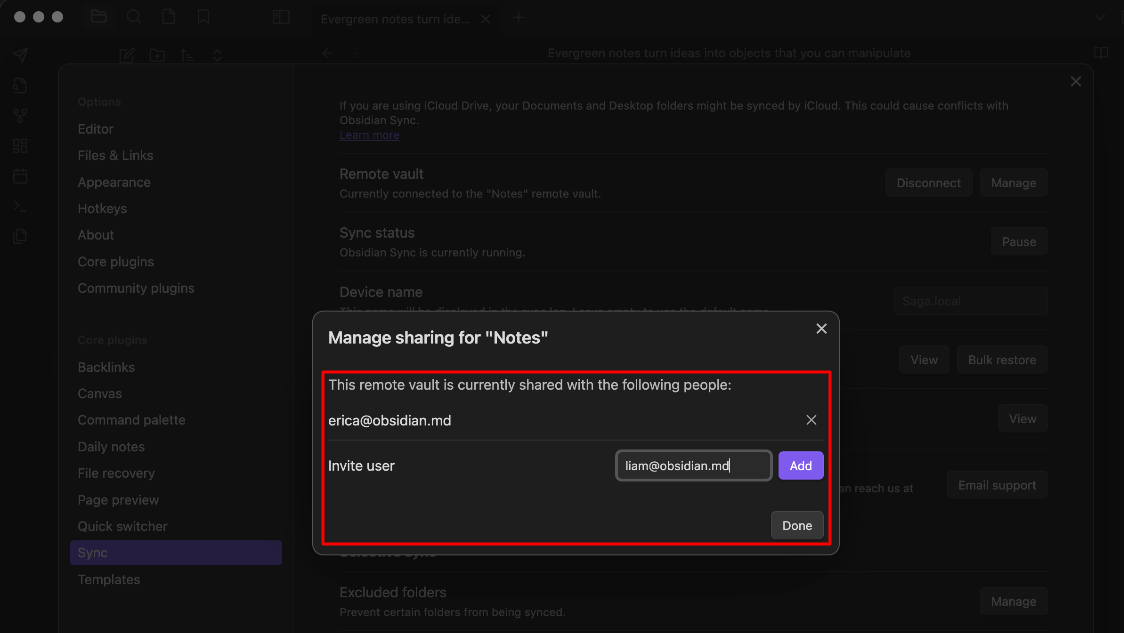
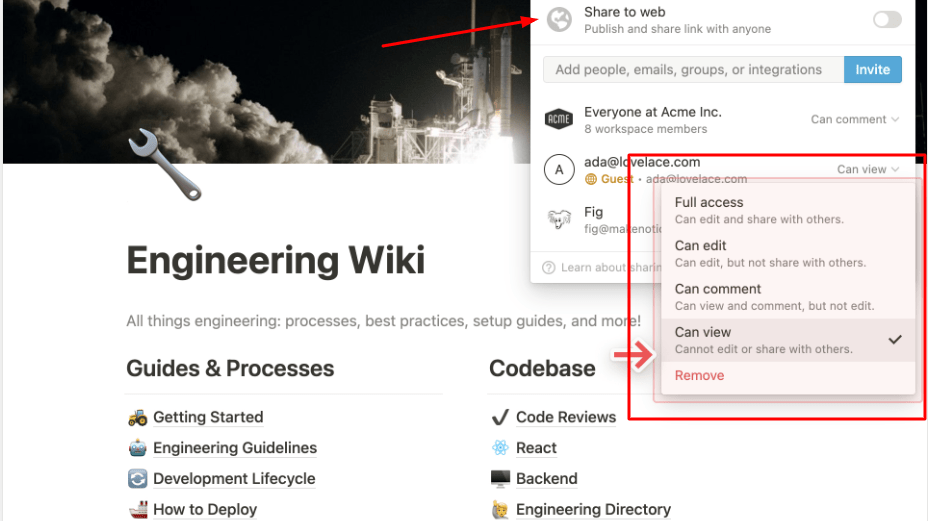
While note-taking features are central to both Obsidian and Notion, Notion positions itself as a productivity app with additional project management and note-taking features. In comparison, Obsidian focuses on note-taking and organization functionality. As a result, Notion offers a wider range of core features, although, in theory, the potential functionalities of Obsidian’s community-developed plug-ins are limitless.
The main difference between Obsidian and Notion is their online/offline functionality. Notion requires an internet connection to use it at its fullest capacity. The app stores your notes and related information on its servers, encrypting network traffic, database credentials, and stored data. As a result, Notion automatically saves your notes and syncs them across your devices when connected to the internet. Compared to Notion, Obsidian stores your notes locally on your device, meaning the company doesn’t have access to them. But this also means your notes are not automatically synced. You need to pay for an extra add-on to sync your Obsidian notes across your devices.
As Notion relies on an internet connection, users can collaborate on a note in real-time. You can share a link that gives them permission to view, comment, or edit your Notion workspace. Obsidian, on the other hand, focuses on personal note-taking. While you can share notes with other users, it doesn’t offer any real-time collaboration features.
A final key difference between the two applications is their approach to pricing. Both offer free paid plans for personal use but their paid plans vary. Notion’s Business plan starts at $15/month/user and the only add-on Notion offers is an AI writing assistant. In comparison, Obsidian’s commercial license is $50/year/user. Obsidian then charges users an additional $8/month to add syncing or publishing features, functionalities that are automatically included in Notion’s subscription.
Obsidian pros and cons
What are the advantages of Obsidian?
- Powerful linking and backlinking: Obsidian's bidirectional linking feature allows users to create a network of interconnected notes, making it easy to navigate and discover related information.
- Markdown support: Obsidian uses Markdown for text formatting, making it ideal for users familiar with this lightweight markup language and providing a distraction-free writing experience.
- Local storage: All data is stored locally, ensuring users have complete control over their information without reliance on cloud services.
- Customizable interface: Obsidian offers a high level of customization, allowing users to personalize the app's appearance and layout to suit their preferences.
- Active community and plugins: Obsidian has a vibrant user community, contributing to the development of various plugins and themes that enhance the software's functionality and aesthetics.
What are the disadvantages of Obsidian?
- Steeper learning curve: Obsidian's extensive features and linking capabilities may require some time for users to fully grasp and integrate into their workflows.
- Limited mobile support: While Obsidian is accessible on mobile devices, the user experience is not as seamless as on desktop platforms.
- No native cloud sync: Unlike cloud-based solutions, Obsidian does not offer native cloud synchronization, necessitating manual syncing for access across multiple devices.
- Lack of collaboration: Obsidian is primarily designed for personal knowledge management, lacking built-in collaboration features for team-based projects.
- No file attachments: As of the current version, Obsidian does not support file attachments directly within notes, which could be a limitation for some users who require multimedia integration.
Notion pros and cons
What are the advantages of Notion?
- Versatile and all-in-one: Notion is a comprehensive tool that combines note-taking, project management, databases, wikis, and more in a single platform, reducing the need for multiple apps.
- Powerful collaboration: Notion excels in team collaboration with real-time editing, commenting, and mentioning features, fostering efficient communication and teamwork.
- Flexible organization: The block-based structure allows users to create dynamic layouts, rearrange content easily, and build custom databases to suit various workflows.
- Rich media integration: Notion supports various media types, including images, files, and embedded content, making it ideal for organizing multimedia-rich information.
- Cross-platform availability: Notion is accessible on web browsers, desktops (Windows, macOS), and mobile devices (iOS, Android), ensuring seamless access from anywhere.
What are the disadvantages of Notion?
- Learning curve: Due to its extensive features and flexibility, new users may find the learning curve steeper when compared to simpler note-taking apps.
- Limited offline access: While Notion has offline capabilities, the full functionality is not available offline, which can be a limitation for users in areas with unreliable internet connectivity.
- Limited data export: Exporting data from Notion can be limited, which might be a concern for users who want to back up or migrate their data to other platforms.
- Pricing tiers: Some users may find Notion's pricing plans relatively expensive, especially when compared to basic note-taking apps.
- Performance issues: Notion's performance may occasionally suffer when handling large databases or complex pages, leading to slower loading times and lag.
Compare Notion to other tools
Obsidian compared to Notion
Obsidian and Notion are two popular note-taking and knowledge management tools, each with its own unique strengths and features to suit different user needs.
Obsidian is praised for its focus on plain-text notes and its use of a local folder-based system. This allows users to have complete control over their data, and it makes syncing and backup processes more straightforward. Obsidian's linking and backlinking features make it an excellent choice for those who prioritize building a web of interconnected ideas and concepts.
On the other hand, Notion is known for its versatility and all-in-one approach. It combines note-taking, project management, databases, and wikis in a single platform, reducing the need for multiple apps. Notion's powerful collaboration features, real-time editing, and commenting make it ideal for teams and remote work environments.
Is Obsidian better than Notion?
Determining whether Obsidian is better than Notion depends on individual requirements and use-cases. Obsidian shines with its bi-directional linking, enabling users to create interconnected knowledge bases that foster personal knowledge management or collaboration in small teams.
On the contrary, Notion's extensive feature set, including task management, databases, and project tracking, makes it a powerful platform for larger teams and diverse workflows. For instance, project managers, content creators, and remote teams may benefit from Notion's versatility in handling multiple aspects of their work.
The better choice between Obsidian and Notion will depend on your specific needs, preferred features, and the scale and complexity of your projects. Obsidian is exceptionally well-suited for individuals or small teams looking to manage research or writing projects efficiently, while Notion shines when it comes to larger teams or diverse use-cases.
What is Obsidian best used for?
Obsidian is best utilized for creating and managing a comprehensive personal knowledge base that empowers users to connect and organize ideas effortlessly. Its standout feature of bi-directional linking enables bidirectional associations between notes, forming a web of interconnected information. For example, researchers can build a network of cross-referenced research findings, and writers can outline their content with linked notes, facilitating a fluid writing process.
Furthermore, Obsidian's graph view offers a visual representation of these data connections, providing users with a holistic understanding of their knowledge structure. This visual aid aids in identifying patterns, discovering insights, and exploring relationships within the knowledge base.
In summary, Obsidian's capabilities make it a powerful tool for individuals seeking a seamless way to manage and explore interconnected information, making it highly suitable for research, writing, and other knowledge-intensive tasks.
Can Obsidian replace Notion?
When considering whether Obsidian can replace Notion, it's essential to evaluate the specific needs of your workflow. Obsidian's strength lies in its exceptional note-taking and bi-directional linking features, making it a powerful tool for personal knowledge management or small team projects.
However, Notion's scope goes beyond mere note-taking. It offers an extensive range of functionalities, including task management, databases, and collaborative features. For example, teams can utilize Notion to create project boards, track tasks, and collaborate on documents in real-time.
Ultimately, the decision to choose Obsidian or Notion depends on whether your focus is primarily on interconnected notes or if you require a more comprehensive tool that encompasses project management and collaboration capabilities.
Is Obsidian cheaper than Notion?
In terms of pricing, Obsidian does hold a slight advantage over Notion. Obsidian, like Notion, offers a free version of the software, allowing users to access its core note-taking and linking capabilities without any cost. Only those businesses using Obsidian’s commercial use plan are required to pay per user, starting at $50 per year.
On the other hand, Notion operates on a subscription-based pricing model, which means users pay a recurring monthly or annual fee to access its full suite of features. While this can lead to higher costs over time, many users find the investment justifiable due to Notion's extensive range of functionalities, including task management, databases, templates, and collaborative features.
For users who prioritize a budget-friendly option with powerful note-taking capabilities, Obsidian may be more appealing. However, users seeking a comprehensive workspace with advanced project management and collaboration tools may find Notion's subscription model worthwhile.
Is there a better Productivity software than Obsidian?
In the realm of project management tools, a diverse array of options awaits, each flaunting its own set of distinctive strengths and attributes. Obsidian, with its exceptional prowess in knowledge base creation and interlinking, offers a unique approach to managing information and ideas.
However, alternatives to Obsidian like Notion, Microsoft OneNote, Simplenote, and Evernote present formidable competition. These alternatives often shine in areas such as organizational tools and seamless integrations, catering to a variety of user needs. The determination of the "better" tool is a nuanced decision, contingent upon individual preferences, project intricacy, and the specific features that harmonize with your workflow.
Notion compared to Obsidian
Notion's strength lies in its versatility and ability to handle a wide range of use cases within a single platform. It excels in organizing and managing various types of content, making it suitable for individuals and teams looking for an all-encompassing solution.
Obsidian, however, appeals to users who prioritize a local-first approach and desire to build a knowledge base with interconnected ideas. Its plain-text format allows for flexibility and easy synchronization, making it a preferred choice for users who value data ownership and offline access.
In conclusion, the choice between Notion and Obsidian will depend on individual needs and preferences. Notion offers a comprehensive and collaborative platform for various workflows, while Obsidian provides a robust system for those seeking a local-first note-taking and knowledge management solution.
Is Notion better than Obsidian?
Notion's extensive features, such as task management, databases, and team collaboration, make it an excellent choice for organizing complex projects and facilitating seamless teamwork. For instance, Notion's ability to create interconnected databases allows users to link related notes and ideas effortlessly, promoting knowledge organization and easy access to information.
Obsidian stands out as a powerful tool for personal knowledge management, particularly for researchers, writers, and individual users seeking a flexible and interconnected note-taking system.
The decision of whether Notion is better than Obsidian depends on the scale of your projects and the specific use-cases you prioritize. If your focus lies in comprehensive project management and team collaboration, Notion is likely the more suitable option.
What is Notion best used for?
Notion excels as a comprehensive productivity platform, encompassing a wide range of use-cases. Its versatility allows users to create and manage various elements, including notes, tasks, databases, and even websites, making it a valuable tool for different purposes.
For project management, Notion's database and task management features streamline workflows. Teams can create boards, timelines, and project databases to visualize progress and keep everyone on the same page. For content creation, Notion offers a clean and organized environment for writing, with the ability to embed media and customize layouts.
Its adaptability and versatility make Notion a preferred choice for individuals and teams seeking a unified and customizable workspace to manage various aspects of their work efficiently.
Can Notion replace Obsidian?
Notion's extensive feature set, covering note-taking, task management, and more, positions it as a capable replacement for Obsidian, particularly for users who value a comprehensive and all-in-one tool. Its database and organization capabilities provide a platform for managing a wide range of information efficiently.
For instance, Notion can be used as a knowledge base, where users can create interconnected notes, capture ideas, and link them together using bi-directional linking. Additionally, teams can collaborate seamlessly, share resources, and manage projects within Notion.
However, if your primary focus is on creating a web of interconnected notes and exploring complex thought processes, Obsidian's simplicity and laser-focused approach make it an attractive choice. Its emphasis on bi-directional linking facilitates building a network of connected ideas.
Is Notion cheaper than Obsidian?
Notion’s pricing operates on a subscription-based system, with four different plans available, including a free plan. Obsidian, however, remains the cheaper option between the two software.
Notion's pricing is justified by its extensive array of features, including note-taking, task management, databases, collaboration tools, and more. For users who leverage these functionalities extensively, the added value of Notion's subscription becomes apparent.
The choice between Notion and Obsidian depends primarily on the specific features you prioritize in your note-taking and productivity workflows and also on your budget.
Is there a better Collaboration software than Notion?
There are several all-in-one productivity tools on the market, but whether they are deemed 'better' than Notion is dependent on individual user needs.
For example, tools like Evernote, Asana, ClickUp and Trello excel in task management and team collaboration, making for suitable alternatives to Notion but possibly lacking the platform’s extensive note-taking capabilities.
The best project management software for you will depend on your specific needs and preferences. If you value a more holistic and customizable approach that includes note-taking and other features, Notion could be the ideal choice.
6 months free on the Plus plan with Unlimited AI on Notion
Get 6 months free on the Plus plan with Unlimited AI on Notion and up to $6,000 savings with Secret.
Features comparison
Notion Takes the Edge for User-Friendliness

When it comes to the user-friendly experience, both Obsidian and Notion offer intuitive interfaces for their users. However, the edge goes to Notion when focusing on ease-of-use. Notion's design is straightforward with easily identifiable controls, making it an ideal start for beginners. It has a uniform, seamless interface that reduces the learning curve for new users, allowing them to quickly adapt and make the most out of the software's functionality.
For example, Notion provides a drag-and-drop editor and a WYSIWYG (What You See Is What You Get) interface, enabling users to create and format content without any coding knowledge or markdown language expertise. The sidebar navigation in Notion is also clear and organized, allowing users to easily find and access different sections and databases.
On the other hand, Obsidian, while robust, can be a little less intuitive, especially for those not familiar with markdown language or wikis. Novices might need more time to navigate the expansive features and complex system Obsidian offers.
Notion Excels at Creating Knowledge Bases

Notion truly stands out in its ability to create comprehensive knowledge bases, making it an invaluable asset for businesses and teams.
With its robust database capabilities, Notion allows users to centralize information, documents, and resources, streamlining collaboration and making knowledge easily accessible. For instance, a marketing team can create a centralized knowledge base with guides, FAQs, and best practices for new employees to reference during onboarding.
On the other hand, while Obsidian excels in creating networked notes for personal knowledge management, it lacks the advanced database features and collaborative workspace that Notion offers, making it more suitable for individual note-taking and personal organization.
Obsidian Controls Data Better than Notion

Obsidian's local storage capability is a significant advantage for users who prioritize data control and privacy. With all notes stored locally on your device, you have complete ownership and control over your data, ensuring that sensitive information remains within your control. This can be particularly important for users who deal with confidential data or are concerned about data security.
Notion's cloud-based storage, however, offers convenience and accessibility from any device with an internet connection. This is beneficial for users who require seamless collaboration and the ability to access their data from multiple devices.
Ultimately, the choice between Obsidian and Notion will depend on the user's priorities and the level of data control they require. Obsidian's local storage provides peace of mind for those concerned about data privacy, while Notion's cloud-based approach offers convenience and accessibility for collaborative work.
Obsidian Outshines Notion with a Wider Range of Integrations
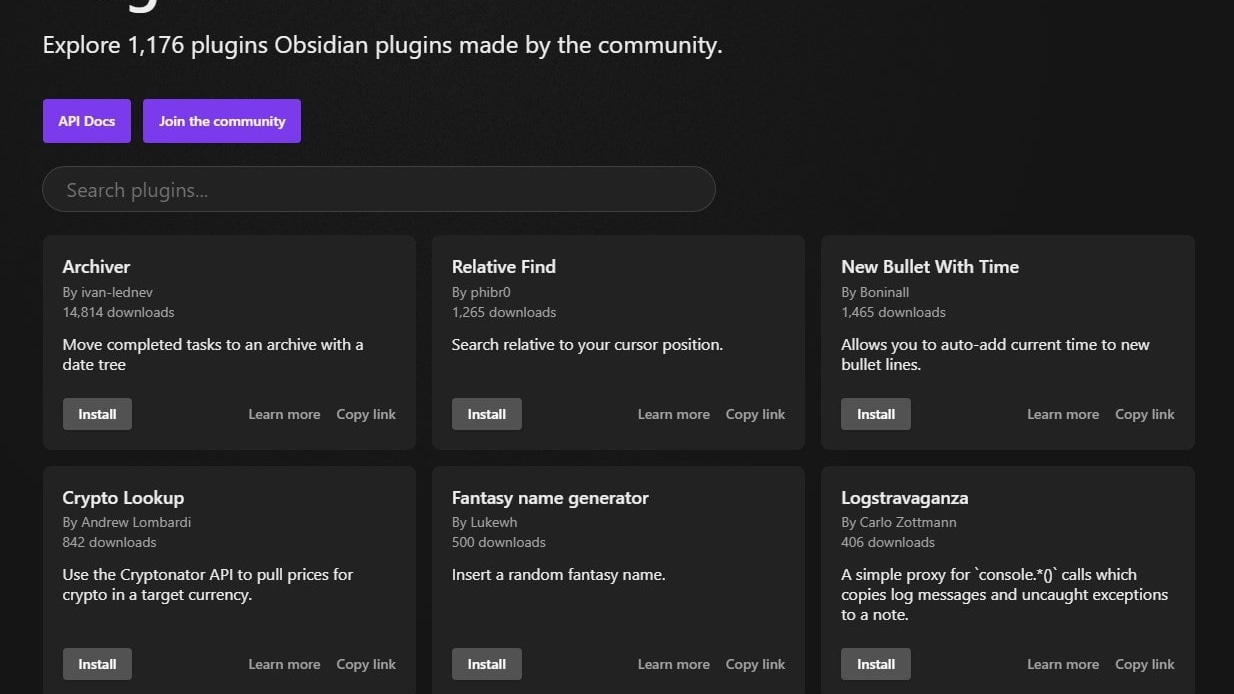
When it comes to integrations, Obsidian takes the lead with an extensive library of 1,000+ core and community-made plug-ins, including third-party app integrations. These plug-ins allow users to customize their Obsidian experience and connect with various tools and services seamlessly.
For example, Obsidian integrates with popular productivity apps like Todoist, Evernote, and Google Calendar, allowing users to sync their tasks, notes, and events between platforms. It also supports integrations with other knowledge management tools like Roam Research and Bear, making it easier for users to import their existing data into Obsidian.
On the other hand, Notion offers 62+ integrations, including well-known analytics tools, design software and collaboration platforms like GitHub, Google Workspace, Canva, and Slack. While Notion's integrations are useful for enhancing productivity and collaboration, the sheer number and variety of integrations provided by Obsidian offer users a more extensive range of possibilities to streamline their workflows and optimize their knowledge management processes.
Notion is Better for Efficient Project Management than Obsidian
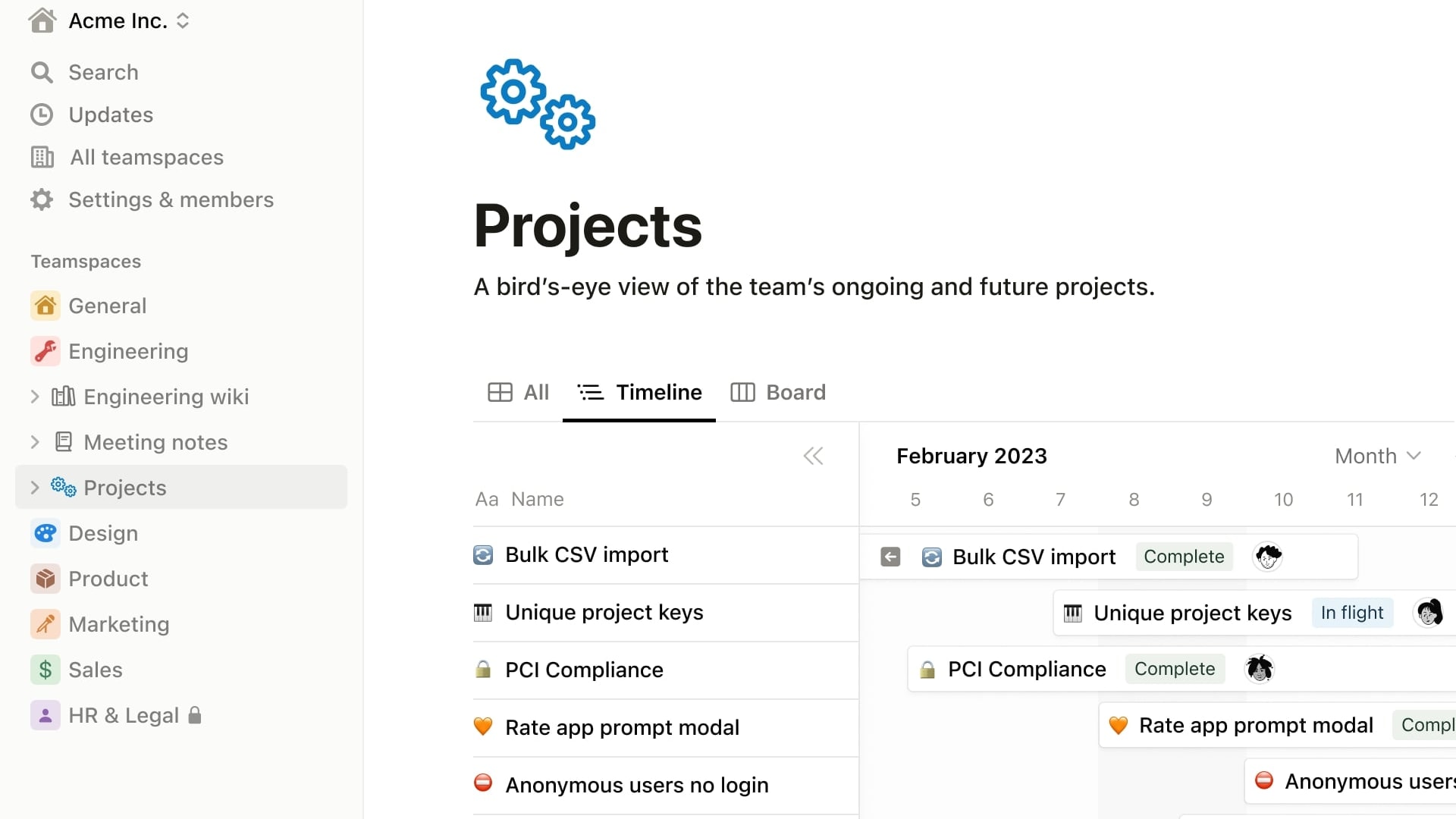
Notion's strength lies in its comprehensive suite of project management tools, making it an ideal choice for efficient project management. It offers a wide array of features such as creating Kanban boards, assigning tasks, setting up notifications, and collaborating with team members. These functionalities enable users to track project progress in real-time, assign responsibilities, and ensure smooth communication and coordination within the team.
In contrast, Obsidian is primarily designed for note-taking and knowledge management, lacking built-in project management capabilities. While Obsidian excels at creating interconnected notes and fostering knowledge organization, it may not be the most suitable tool for handling complex project workflows or team collaboration.
In conclusion, for users seeking a dedicated project management solution with a comprehensive set of tools, Notion proves to be the better option over Obsidian, which is more focused on note-taking and knowledge management.
Both Obsidian and Notion Provide Great Note-Taking Capabilities

Both Obsidian and Notion are powerful note-taking tools with distinct capabilities. Obsidian offers robust support for markdown formatting, empowering users to create well-structured and detailed notes. Markdown allows users to add headers, lists, images, links, and other formatting elements to their notes effortlessly.
Notion provides a versatile and user-friendly note-taking experience. Its intuitive interface allows users to create and organize notes in various formats, including tables, databases, and media-rich pages. Notion's block-based system enables users to add different types of content blocks within a single note, making it easy to incorporate text, images, files, and more in a single cohesive document.
Both Obsidian and Notion provide excellent note-taking capabilities, catering to different user preferences and note-taking styles. Whether you prefer a markdown-based approach in Obsidian or the flexible block-based system in Notion, both tools ensure that you can capture and organize your ideas effectively.
Obsidian is Best at Supporting Markdown

Obsidian's robust support for markdown formatting sets it apart from Notion in the realm of note-taking. Markdown is a lightweight markup language that allows users to format text using simple and intuitive symbols. This feature makes creating structured and visually appealing notes effortless.
For instance, a software developer documenting their code may find Obsidian's markdown support invaluable as it helps them maintain consistency and readability in their notes. With Markdown, the developer can easily format code snippets, add headers, lists, and links, making their notes more organized and accessible.
In contrast, while Notion does offer basic text formatting options, it lacks the comprehensive support for Markdown, making it less suitable for users who prefer this lightweight and efficient markup language.
Subscribe to our newsletters.
No FOMO here. Stay up-to-date on all the latest deals and news with our monthly newsletter straight to your inbox like 126,000+ entrepreneurs (+ Get 10% off on on our Premium Membership!)
Obsidian vs Notion: Which is the best for your business?
Obsidian is the best tool for you if:
- You want a straightforward yet multi-layered note-taking and organization tool for plain text-based notes only
- You’re an individual or small team looking for a knowledge management tool, for example, for a research project
- Bi-directional linking is an essential feature of your note-taking to create a network of related ideas, concepts, and projects from your notes
- You’re familiar with using Markdown language and can work comfortably with it to create structured notes
- You want an extensive range of native integrations, both built-in and community-made, to fully customize your use of the platform
Notion is the best tool for you if:
- You’re looking for a flexible note-taking and project management tool with a broad range of features including databases and wikis to help you manage larger projects
- Collaboration is a focus for your organization and features like real-time editing, mentions, and comments are non-negotiables
- You want the flexibility to add rich media elements to your notes, such as images, videos, links, and websites
- It’s crucial for you to have access to your notes from anywhere, so you need automatic syncing across your devices including desktops, mobile devices, and web browsers
- Your organization relies heavily on knowledge bases and requires a tool to centrally create, store, and organize internal documents and resources
Alternatives to Obsidian & Notion
Promotions on Productivity software
Start saving on the best SaaS with Secret.
Secret has already helped tens of thousands of startups save millions on the best SaaS like Obsidian, Notion & many more. Join Secret now to buy software the smart way.


